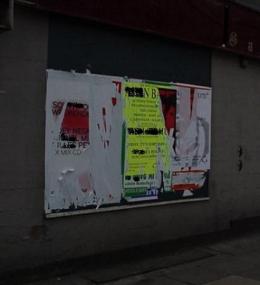Fly-posting
Fly-posting
Controls on illegal outdoor advertising
Contents
Overview
Illegal methods are sometimes used to advertise events or businesses. These may be posters, stickers, placards, banners or bills that are put up without the permission of the property owner and without the required advertising consent.
Fly-posting spoils the local environment, leads to further degradation and lack of confidence in an area, and it can also be difficult and costly to remove fly-posters, which may damage property. It also undermines the viability of advertising agents and their clients who use legitimate means. Fly-posters or placards on roadsides and highway structures, such as traffic lights or railings, can cause safety issues to both drivers and pedestrians.
Unauthorised adverts on the Council's property will be removed.
Report fly-posting
Telephone us on 0191 278 7878 or contact the police.
If you witness fly-posting and the offence is ongoing, telephone the police. This is criminal damage and the offenders may be caught during or soon after the offence.
Enforcement and penalties
Fly-posting is a criminal offence under both the Town and Country Planning Act 1990 and the Criminal Damage Act 1971. If the adverts are on highway property, without the consent of the highway authority, an offence under the Highways Act 1980 is also committed.
Each illegal advert can attract a fine of up to £2,500 in the magistrates' court. More severe penalties exist if the offence is charged as criminal damage.
The Council prosecutes persons caught fly-posting and also businesses that benefit from the illegal advertising. In some suitable cases, a fixed penalty notice of £100 may be issued to a person found putting up an illegal advert.
Removal of fly-posters
Illegal adverts on street furniture or on structures beside highways will be removed by the Council under section 132 of the Highways Act 1980.
Under section 225 of the Town and Country Planning Act 1990, where a placard or poster identifies the person who displayed it or caused it to be displayed, the Council may serve notice on them to remove it. This may be in addition to any prosecution. Where the person served with the notice does not remove the advert, or where the Council cannot trace a relevant person, it may remove or obliterate the advert.
The Council also has a power to issue a community protection notice to a property owner under section 43 of the Anti-social Behaviour, Crime and Policing Act 2014 which would require them to remove the fly-posters if their conduct is unreasonable and having a detrimental effect, of a persistent or continuing nature, on the quality of life of those in the locality.
Further information
HM Government publishes guidance for outdoor advertisers.
You may need to apply for advertisement consent to display an advertisement. Outdoor advertisements must comply with five 'standard conditions'. They must:
- be kept clean and tidy
- be kept in a safe condition
- have the permission of the owner of the site on which they are displayed (this includes the highway authority if the sign is to be placed on highway land)
- not obscure, or hinder the interpretation of, official road, rail, waterway or aircraft signs, or otherwise make hazardous the use of these types of transport
- be removed carefully where so required by the planning authority.
Related Pages
If you would like to give us feedback on our website, please complete this short online form.
